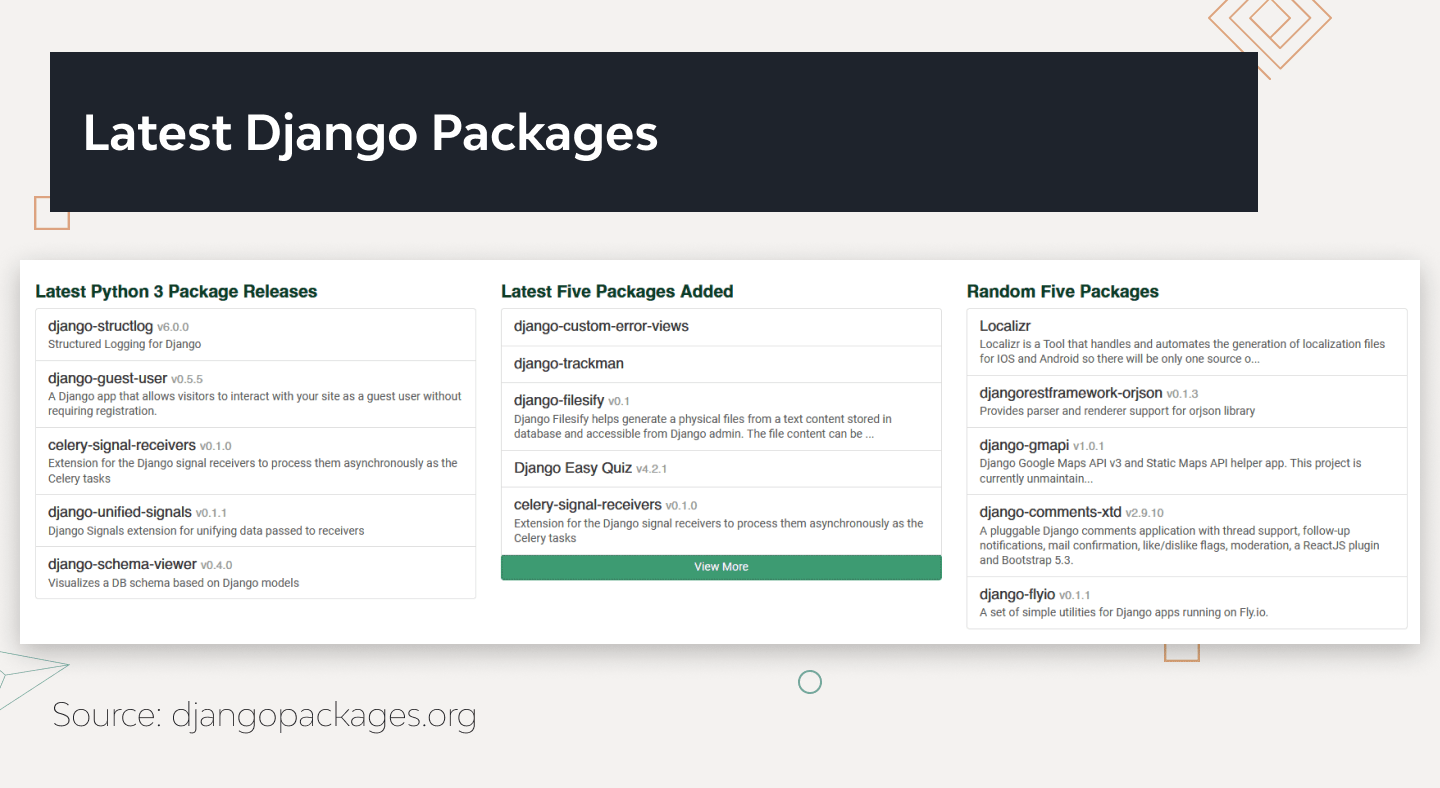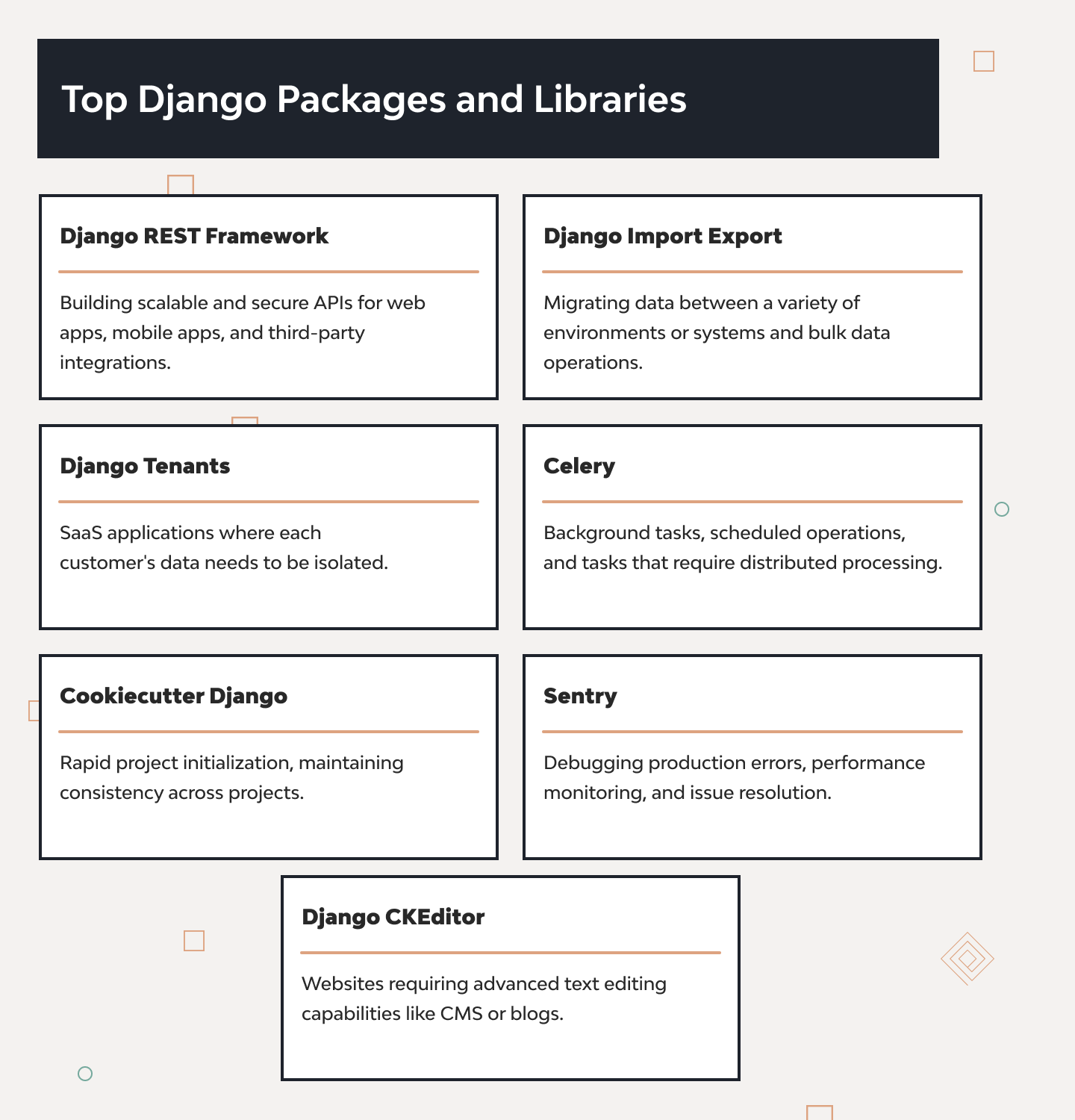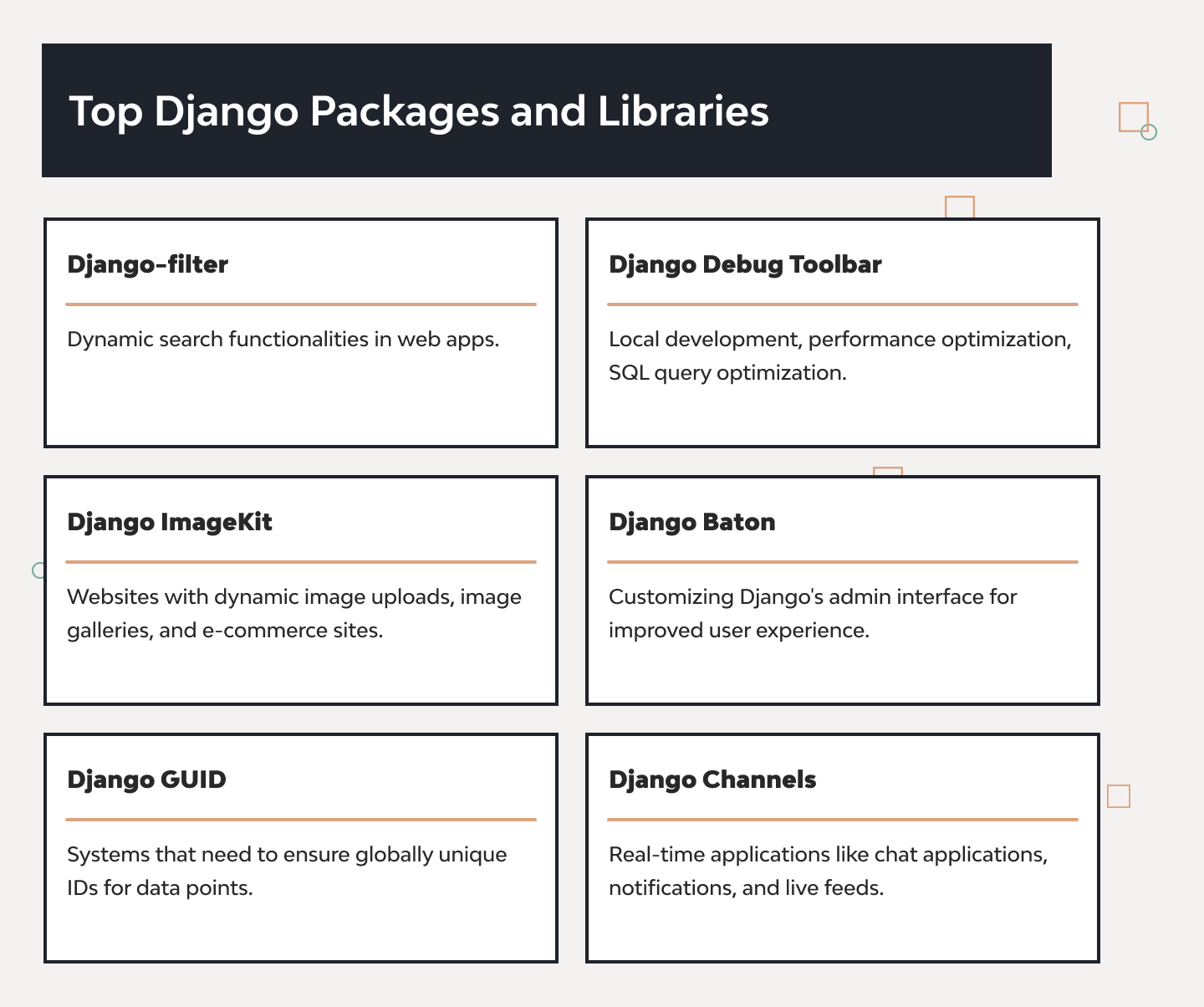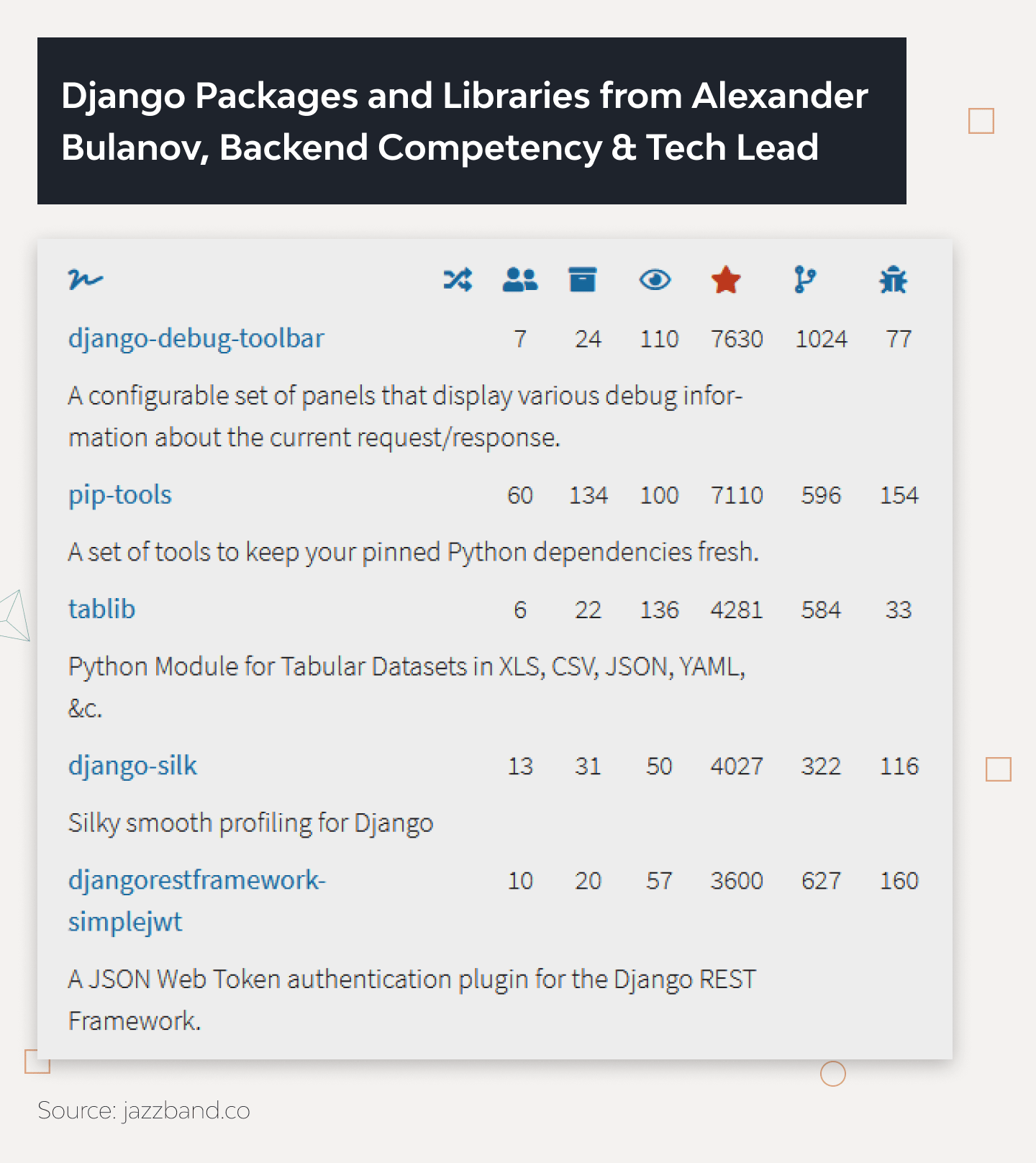Top 20 Most-Used Django Packages and Libraries

Exploring the most popular Django’s packages and libraries offers a deep dive into development theory and practical apps. This exploration goes beyond just coding— it involves understanding developer insights, considering varied use cases, and evaluating the strengths and weaknesses of each tool.
Django is powerful on its own, but its external packages and libraries unlock far more. We use that ecosystem to ship feature-rich, robust applications faster and with fewer resources. This works because Django history—a “batteries-included” philosophy from the start—created a mature, well-maintained package ecosystem for common web problems.
Top 13 Django Packages and Libraries. Theoretical Aspects
The true power of Django shines when augmented with the right packages. These open source django libraries not only enhance the framework’s native capabilities but also streamline development processes.
At DjangoStars, we’ve leaned on various packages, each catering to distinct needs. Here’s an in-depth look at some of the most popular Django packages list.
1. Django REST Framework
Project Example: Instagram’s Web APIs
Description: One of the most widely used Django packages. A robust toolkit tailor-made for building Web APIs, optimizing and simplifying the process of creating RESTful APIs.
Common use cases: Building scalable and secure APIs for web apps, mobile apps, and third-party integrations.
Benefits and considerations: Provides serialization, authentication, and viewset features. However, it’s essential to keep the package updated for security reasons.
2. Django Import Export
Project Example: Tablib
Description: Facilitates seamless data import and export processes, supporting multiple formats.
Common use cases: One of the best Django packages for migrating data between a variety of environments or systems and bulk data operations.
Benefits and considerations: Streamlines data operations but demands cautious handling to prevent data inconsistencies.
3. Django Tenants
Project Example: SaaS platforms like KPI.com
Description: Enables multi-tenant data architecture, allowing data segregation for various clients.
Common use cases: Good choice from other popular Django library lists for SaaS applications where each customer’s data needs to be isolated.
Benefits and considerations: It simplifies multi-tenancy but requires a clear understanding for efficient architecture design.
Read Also: Open-Source vs SaaS in Python
4. Celery
Project Example: Disqus comment platform
Description: An asynchronous task manager, handling distributed message passing for efficient task scheduling.
Common use cases: Background tasks, scheduled operations, and tasks that require distributed processing.
Benefits and considerations: Enhances performance and scalability but involves a steeper learning curve for setup.
5. Cookiecutter Django
Project Example: Many startups initiating their MVPs
Description: A template framework to set up Django projects quickly, incorporating best practices.
Common use cases: Rapid project initialization, maintaining consistency across projects.
Benefits and considerations: Speeds up setup but may come with unnecessary modules for smaller projects.
6. Sentry
Project Example: Eventbrite
Description: Error tracking tool that integrates with Django for real-time error monitoring.
Common use cases: Debugging production errors, performance monitoring, and issue resolution.
Benefits and considerations: Instant error alerts enhance efficiency, though configuration might be overwhelming for beginners.
7. Django CKEditor
Project Example: Numerous CMS platforms and blogs
Description: Rich text editor integrated with Django, enhancing text input fields in forms.
Common use cases: Recommended among various Django libraries for websites requiring advanced text editing capabilities like CMS or blogs.
Benefits and considerations: Provides a user-friendly interface, but customization may require deeper understanding.
8. Django-filter
Project Example: E-commerce platforms with dynamic product listings
Description: Adds filtering capabilities to Django queries, working seamlessly with the ORM in Django to make data retrieval more flexible and efficient.
Common use cases: Dynamic search functionalities in web apps.
Benefits and considerations: Simplifies complex queries but demands caution to prevent unintentional data exposure.
9. Django Debug Toolbar
Project Example: Local development environments for various Django-based platforms
Description: Offers a set of configurable panels displaying debug info, streamlining the Python debugging process.
Common use cases: Local development, performance optimization, SQL query optimization.
Benefits and considerations: Aids in pinpointing issues, but shouldn’t be used in production environments.
10. Django ImageKit
Project Example: Pinterest
Description: Automates image processing in Django, optimizing the management of image files.
Common use cases: Websites with dynamic image uploads, image galleries, and e-commerce sites.
Benefits and considerations: Streamlines image operations, though it necessitates a well-thought-out storage strategy.
11. Django Baton
Project Example: Customized CRM solutions with enhanced admin interfaces
Description: A modern alternative for the Django admin interface, enhancing the default appearance and functionality.
Common use cases: Customizing Django’s admin interface for improved user experience.
Benefits and considerations: Elevates user experience but might require some time for full customization.
12. Django GUID
Project Example: Enterprise-level applications that need global unique identifiers across different databases
Description: Provides globally unique identifiers for Django models, ensuring distinct identification.
Common use cases: Systems that need to ensure globally unique IDs for data points.
Benefits and considerations: Offers unique data identifiers, but can be overkill for smaller applications.
13. Django Channels
Project Example: Slack
Description: Extends Django’s capabilities to handle WebSockets, facilitating real-time communication.
Common use cases: Real-time applications like chat applications, notifications, and live feeds.
Benefits and considerations: Enables real-time features, yet requires additional setup and understanding of asynchronous programming.
In the subsequent sections, we delve deeper into each package’s nuances, shedding light on their pivotal role in various Django projects.
Each tool not only shapes the development pathway but also propels applications with tested, adopted technologies. As we navigate through each, consider how their functionality can weave into your projects. The right package should enhance, not complicate, your codebase.
It’s good to choose libraries in Django that align with your development goals and ensure a smooth, efficient development journey. When evaluating the best Django hosting, confirm it supports your chosen libraries (DB drivers, cache/storage backends, task queues) and pin versions in requirements.txt to avoid deployment surprises.
Practical insights from our development team into some packages await in the sections to follow, aiming to enrich your Django development efforts.
Django Packages and Libraries from DjangoStars team
The next chapter reveals the best Django packages, endorsed by developers through real project use. These practical insights illuminate the impactful use of each tool, offering a shortcut to informed decisions without your personal testing.
Django’s built-in packages provide essential utilities, while third-party packages extend its functionalities and applications.
ALEX RYABTSEV. Backend Competency & Tech Lead
My best frameworks for Django:
1. Django REST Framework
Pros: Enables developers to build robust Web APIs with ease.
Practical Application: In one of our high-traffic applications, DRF allowed us to rapidly develop a stable API to handle thousands of requests per minute with its built-in throttling and pagination features.
2. Django-Modeltranslation
Pros: Ideal for providing seamless multi-language support in Django applications.
Practical Application: We efficiently launched a multi-language e-commerce platform with Django-Modeltranslation. The goal was to ensure a unified user experience across various language preferences without managing separate models for each language.
3. Django-Constance
Pros: Offers dynamic configurations, promoting flexibility without necessitating redeployments for modifications.
Practical Application: Django-Constance enabled our team to modify configuration settings on the fly during live broadcasts without disrupting ongoing operations.
4. Django-Environ
Pros: Allows adept management of environment variables and configurations.
Practical Application: This package secured our application by allowing us to keep sensitive keys and production configurations out of the code. This enhances security while ensuring scalability.
5. Django-Extensions
Pros: Introduces additional management commands and enhancements that streamline development workflows.
Practical Application: The ‘shell_plus’ command has been a boon. We managed to debug and explore models effortlessly by automatically importing all model classes.
SERGEY KUBRAK. Backend Competency & Tech Lead
Here is my list of the top 5 Django Packages:
1. DRF
Pros: A great tool for web API creation.
Practical Insight: DRF enabled us to establish clear, efficient, and scalable APIs across our projects. It ensures stable data communication between our apps and external services.
2. DRF-spectacular
Pros: A nice package enhancing DRF by facilitating comprehensive API documentation.
Practical Insight: We made documentation with DRF-spectacular. This has eased the onboarding process for our frontend developers by providing clear API endpoints documentation.
3. Django-Environ
Pros: Streamlines the management of Django settings using environment variables.
Practical Insight: Django-Environ aids us in maintaining a clean separation between our code and configuration. It secures sensitive data, and helps adjust settings for various environments.
4. Ruff
Pros: Not Django exclusive, but good for enforcing PEP compliance and formatting Python code.
Practical Insight: Ruff helps our codebase remain clean and adheres to formatting standards. What we have is minimizing technical debts and ensuring long-term maintainability.
5. Pytest
Pros: A universal Python testing framework. It’s lauded for its versatility.
Practical Insight: QA efficiency has increased. Pytest’s fixtures and parameterized testing features have allowed us to write more robust tests with less code.
ALEXANDER BULANOV. Backend Competency & Tech Lead
My top list is not very big and here it is.
DDT (Django Debug Toolbar)
Pros: A comprehensive debugging tool with invaluable insights for various development phases.
Practical Insight: DDT allowed us to identify and troubleshoot inefficient database queries, thus optimizing performance during a critical product launch.
ROMAN OSIPENKO. CTO
I try to integrate a blend of Django libraries in Python and other Python libraries in each project to ensure precision, efficiency, and stability. My top picks include:
1. Mypy
Pros: Ensures robust type-checking, enhancing code quality and stability.
Practical Insight: Mypy is important in averting type-related errors in our applications, ensuring safer deployments, and mitigating potential runtime issues.
2. Ruff
Pros: While not strictly Django-related, it’s invaluable for maintaining PEP-compliant and clean Python code.
Practical Insight: Ruff not only enforces standardized coding practices across our development team but also ensures our codebases remain clean and easily navigable.
3. Black
Pros: Known as “The Uncompromising Code Formatter,” Black auto-formats Python code to comply with PEP 8.
Practical Insight: Black automates our code formatting processes, freeing our developers to focus on logic and problem-solving rather than syntax aesthetics.
4. Ipdb
Pros: Enhances debugging with interactive capabilities, making issue resolution quicker and more intuitive.
Practical Insight: Ipdb has facilitated a smoother debugging experience, enabled us to rapidly diagnose and rectify issues during the development phases.
5. Poetry
Pros: Manages Python project dependencies and packaging with eloquence and simplicity.
Practical Insight: Poetry has simplified our dependency management, preventing dependency hell and ensuring smooth project setups.
6. Anymail
Pros: While it aligns more closely with Python than Django specifically, it is frequently used in Django projects. Anymail integrates multiple transactional email service providers (ESPs) with Django under an API.
Practical Insight: Anymail has enabled us to switch between ESPs without altering codebase email functionalities, affording us the flexibility to opt for the most cost-effective and efficient ESP at any given time.
DjangoStars as Your Python Django Development Partner
With over a decade in the industry, DjangoStars’ experienced team has driven success in sectors like FinTech, by developing secure and compliant financial platforms, and HealthTech, by ensuring user-friendly and HIPAA-compliant solutions. There would be a lot of text if we write about all the domains here.
From establishing scalable APIs to crafting real-time applications, our custom Django development services reflect quality and expertise. Align with DjangoStars and embark on a smooth, innovative, and outcome-driven development journey.
At DjangoStars, we build more than just projects – we build partnerships. Known for our long-term collaborations, we ensure your project is nurtured and technologically refreshed throughout its lifecycle. With a strategic deployment of top Django packages, we guide your project from inception through to sustained success, ensuring scalability and technological relevance.
Conclusion
Navigating through Django libraries can be a venture. By exploring various packages and their unique capabilities, this guide aids developers in making informed decisions for their Django projects. Pairing this knowledge with DjangoStars’ proven expertise ensures the development of robust, efficient, and cutting-edge digital solutions.
- Can I use Django packages without any cost?
- Yes! Most Django packages, like Django REST framework or Django Allauth, are open source django packages. This makes them budget-friendly options for enhancing your projects.
- Is community support available for these Django packages?
- Definitely. Robust community support and extensive documentation, especially for widely-used packages like Celery or Django Channels, ensure a helpful hand is always available.
- Are the packages applicable to all Django projects?
- While these packages offer wide-ranging functionalities, their fit depends on specific project needs. For example, Django Haystack might be crucial for projects needing an advanced search feature.
- How does DjangoStars choose packages for a project?
- At DjangoStars, we meticulously assess project needs, ensuring selected packages, such as Django Oscar for e-commerce platforms, seamlessly align with and enhance project functionality and scalability.
- Can DjangoStars assist with migrating an existing Django project to integrate new packages?
Yes! DjangoStars specializes in enhancing existing Django projects. We ensure they benefit from the integration of relevant packages, such as upgrading a project to utilize Django CMS for more intuitive content management.
Your pathway to efficient and innovative Django development is illuminated with the insights of curated Django packages and the expert partnership of a seasoned team like DjangoStars. Navigate through your development journey with knowledge, expertise, and the right tools in your arsenal.













